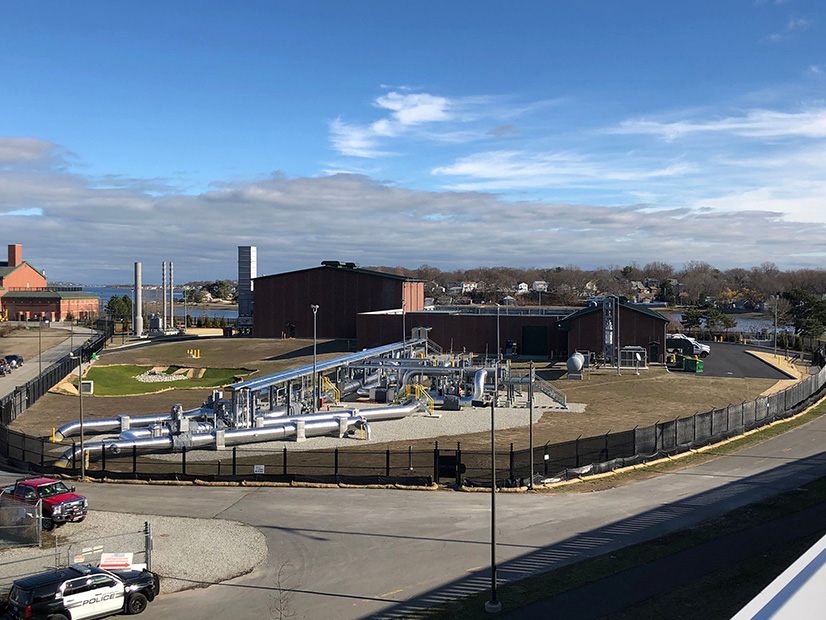
Opponents of a natural gas compressor station made a long-shot bid to close the facility in oral arguments Thursday at the D.C. Circuit Court of Appeals that focused on FERC’s handling of environmental justice concerns.
The compressor is part of Algonquin Gas Transmission’s $627 million Atlantic Bridge Pipeline Project, which expanded capacity into the area.
The commission approved the pipeline expansion, including the compressor, on a peninsula in the city of Weymouth, Mass., in early 2017. In September 2020, the compressor station had two unplanned releases of natural gas, leading a number of groups to ask FERC to reconsider the project.
The commission then took the rare step of asking for briefings on the environmental justice impacts of the compressor after the certificate had been granted and upheld on appeal to the D.C. Circuit.
In an order dealing with those briefings issued in January 2022, FERC let the project keep its certificate. However, then-Chair Richard Glick said he thought the earlier order was likely a mistake, though it could not legally be overturned as the time for rehearing had passed and the D.C. Circuit had upheld that initial decision.
“Although it is cold comfort for the residents near the compressor station, I hope that this proceeding will serve as a turning point for the commission as we work to better consider, address and act on issues of environmental justice,” Glick said during the 2022 briefings.
The attorney for Fore River Residents Against the Compressor Station, Michael Hayden of Morrison Mahoney LLP, told the three-judge panel Thursday that FERC’s decision on the briefings was a “Pyrrhic victory.”
Since then, Glick was denied a nomination hearing before the Senate, which means FERC is more prone to deadlock on such cases with two members from each party, he added.
“I recognize it is a mountainous uphill climb for my clients [to] expect any change to occur before FERC,” Hayden said. “So we don’t expect it to happen voluntarily. It is only going to happen through the influence of the courts.”
The judges asked questions focusing on the same procedural issues that FERC said tied its hands in reviewing the environmental justice concerns. Chief Judge Sri Srinivasan noted that Hayden and his clients were not challenging the 2020 order that authorized an extension of the project’s certificate, but only the order on briefs that also dealt with the rehearing on the extension request.
FERC granted an extension request to the Atlantic Bridge project just 34 minutes after receiving it in the days following Christmas 2018, through an order issued by a staffer. Hayden complained that stopped his clients and others from even having a chance to challenge the firm’s request for an extension.
FERC attorney Jared Fish noted that the staff was in a position to act because it had been monitoring the project’s efforts to get state permits, which were also heavily litigated and delayed. The entire commission later confirmed that order, giving opponents a chance to weigh in on the merits of the extension. But they did not seek rehearing of that order, instead challenging the 2022 order on the briefings.
That 2022 order was an “unusual animal” that constituted a rare third round before the commission, Judge Patricia Millet said.
“I feel like it’s … a little unfair to put on them not to know how to challenge it,” she said.
FERC effectively asked the towns and residents to make their case; the commission seemed to agree with them; but then nothing was changed, Millet said.
“I credit FERC for having done the work and professed its need to change going forward,” Millet said. “But … real people are getting lost in the technicalities of all of this.”
Fish said the problem was that the petitioners asked FERC to reopen its decision granting a certificate, which is not something that it was legally able to do as the 60-day rehearing period had long ended and the court had already upheld the decision.
“You ask for new evidence, new briefing arguments about events that post-date the facility coming online, but it’s not a reopening?” said Millet. “How is it not a reopening?”
Fish answered that FERC was looking for information to determine whether Algonquin was still in compliance with its certificate based on the unintentional releases of natural gas and other new information such as COVID’s impact on environmental justice communities. The commission ultimately found no credible allegation that Algonquin was out of compliance with its certificate order or other permits, he added.



